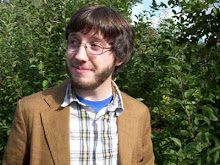This week, I've been reading Margaret Atwood's excellent "Oryx and Crake." It's a post-apocalyptic story, which means it touches upon a lot of the points of future-dystopian novels like "The Hunger Games," but in her hands it seems completely original, like she took the formula and decided to reinvent it. Sure, we have a solitary individual in a wasteland, but the human threats that usually plague these characters are absent. Instead, the character becomes a kind of prophet. Okay, I'm getting ahead of myself, so I'll rewind.
"Oryx and Crake" is a story about Snowman, who was known as Jimmy before humanity was completely wiped out by some kind of plague (I haven't gotten to the revelation of the nature and scope of the plague, but I'm sure it's coming.) The world before the plague was already dystopian, with giant genetic engineering companies existing on compounds while the rest of the country lived in the "pleeblands," and the most terrifying part of the whole thing is that it doesn't seem like a far-off future. They still use computers and the internet, and some of the research taking place within the corporations is already happening (isolating the glowing gene from jellyfish, for example). Snowman finds himself as possibly the last living human, left to care for a new race known as the "Children of Crake." These post-humans were invented by Snowman's best friend, Crake, who apparently was attempting to create a more peaceful, perfect race through genetic engineering.
Snowman has become something of an oracle for them, telling them the myths of Crake and of Snowman's lost love, Oryx. Oryx is the mother of the animals, according to Snowman, although genetic experimentation created these, too--it is a world populated by "rakunks," raccoon-skunk hybrids, and "wolvogs," dangerous wolf-dogs. I'm just about halfway through the novel now, but it's incredibly interesting. In addition to the problems of being (possibly) the last human on earth, including a dwindling food supply and madness brought on by isolation, Snowman finds himself trying to explain concepts of the "Dark Ages" to the Children of Crake: there's a particularly great moment where he's trying to imagine an explanation for toast. It's incredibly bleak, but the way the world before the plague is presented is somehow worse. It's almost as though someone pressed a reset button when things got to their most depraved and desperate.
This novel is the first in a trilogy, the second being the new "Year of the Flood," and I think that title gives a big hint toward the purpose of the plague. In the biblical flood, God decides that humans are getting too evil and decides to wipe them out. In this world, it seems that someone, possibly Crake, decided the same thing. But unlike God, Crake didn't want to risk humanity destroying things again, so he made his Noah (or Noahs) a race of peaceful, vegetarian "Crakers."
I highly recommend this book, especially if you're into the genre of post-apocalyptic science fiction, but even if you're not. The novel, more than being science fiction, is a really terrifying and brilliant look at science going too far, and a great story about a character trying to live in a difficult situation. I'm really looking forward to seeing where Atwood is going with this--I can't believe how different this book is from the last one of hers I read, "Moral Disorder." Her ability to write so many different kinds of fiction is just incredible, but more impressive is her ability to present compelling characters in any type of story.
Monday, January 11, 2010
Fiction Mondays: Oryx and Crake
Labels:
Books,
Fiction Mondays,
Stories
Subscribe to:
Post Comments (Atom)

No comments:
Post a Comment